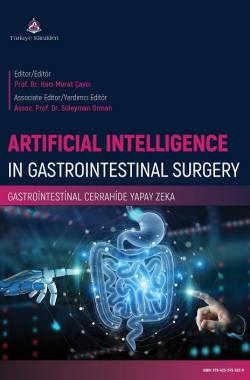ARTIFICIAL INTELLIGENCE (AI) IN PREDICTIVE ANALYTICS AND PERSONALIZED MEDICINE FOR GASTROINTESTINAL SURGERY
Cem Batuhan Ofluoğlu
Sancaktepe Şehit Prof. Dr. İlhan Varank Training and Research Hospital, Department of Gastroenterology Surgery, İstanbul, Türkiye
Ofluoğlu CB. Artificial Intelligence (AI) in Predictive Analytics and Personalized Medicine for Gastrointestinal Surgery. Çaycı HM, ed. Artificial Intelligence (AI) in Gastrointestinal Surgery. 1st ed. Ankara: Türkiye Klinikleri; 2025. p.145-151.
ABSTRACT
The incorporation of artificial intelligence, predictive analytics, and personalized medicine into gastrointestinal surgery has transformative impact for healthcare professionals and patients alike. Surgeons can enhance preoperative, intraoperative, and postoperative procedures by utilizing the capabilities of artificial intelligence, including data analysis, real-time decision-making, and predictive modeling. Predictive analytics, aided by artificial intelligence, facilitate surgery planning by assessing complication risks based on unique patient profiles that encompass genetic, physiological, and environmental aspects. Personalized medicine seeks to customize therapies for individual patients by utilizing molecular and genomic information. The incorporation of artificial intelligence into surgical procedures may have disadvantages, such as data security difficulties, algorithmic bias, and challenges with practical implementation. This section evaluates the transformative influence of artificial intelligence in gastrointestinal surgery, highlighting its therapeutic applications, ethical challenges, and future advancements.
Keywords: Artificial intelligence; Precision medicine; Risk assessment; Surgery; Surgery computerassisted
Kaynak Göster
Referanslar
- Topol EJ. High-performance medicine: the convergence of human and artificial intelligence. Nat Med. 2019;25:44-56. [Crossref] [PubMed]
- Matheny ME, Ahmed M, Whicher D, Thadaney-Israni S, eds. AI in Health Care: The Hope, the Hype, the Promise, the Peril. Washington, DC: National Academy of Medicine; 2019. [Link]
- Kelly JE, Hamm S. Smart Machines: IBM's Watson and the Era of Cognitive Computing. New York, NY: Columbia Business School Publishing; 2013. [Crossref]
- Hashimoto DA, Rosman G, Rus D, Meireles OR. Artificial intelligence in surgery: promises and perils. Ann Surg. 2018;268:70-76. [Crossref] [PubMed] [PMC]
- Colborn K, Brat G, Callcut R. Predictive Analytics and Artificial Intelligence in Surgery-Opportunities and Risks. JAMA Surg. 2023;158(4):337-338. [Crossref] [PubMed] [PMC]
- Schork NJ, Nazor K. Integrated Genomic Medicine: A Paradigm for Rare Diseases and Beyond. Adv Genet. 2017;97:81-113. [Crossref] [PubMed] [PMC]
- Biamonte J, Wittek P, Pancotti N, Rebentrost P, Wiebe N, Lloyd S. Quantum machine learning. Nature. 2017;549:195-202. [Crossref] [PubMed]
- Gil D, Gil V, Lobenhofer E, Thomas T. Research insights: coming soon to your business -- quantum computing: five strategies to prepare for the paradigm-shifting technology. IBM Research; 2018. [Link]
- Mohseni A, Ghotbi E, Kazemi F, Shababi A, Jahan SC, Mohseni A, et al. Artificial Intelligence in Radiology: What Is Its True Role at Present, and Where Is the Evidence? Radiol Clin North Am. 2024;62(6):935-947. [Crossref] [PubMed]
- Moglia A, Georgiou K, Georgiou E, Satava RM, Cuschieri A. A systematic review on artificial intelligence in robot-assisted surgery. Int J Surg. 2021;95:106151. [Crossref] [PubMed]
- Wang F, Preininger A. AI in health: state of the art, challenges, and future directions. Yearb Med Inform. 2019;28:16-26. [Crossref] [PubMed] [PMC]
- Goodman ED, Patel KK, Zhang Y, Navare SM, Friedlander SG, Lin H, et al. A real-time spatiotemporal AI model analyzes skill in open surgical videos. arXiv. Published online December 14,2021. [Link]
- Fazlollahi AM, Bakhaidar M, Alsayegh A, Aljohani A, Alqahtani S, Alharbi M, et al. Effect of artificial intelligence tutoring vs expert instruction on learning simulated surgical skills among medical students: a randomized clinical trial. JAMA Netw Open. 2022;5(2):e2149008. [Crossref] [PubMed] [PMC]
- Loftus TJ, Tighe PJ, Filiberto AC, et al. Artificial Intelligence and Surgical Decision-making. JAMA Surg. 2020;155(2):148-158. [Crossref] [PubMed] [PMC]
- Hartmaier RJ, Albacker LA, Chmielecki J, Bailey M, He J, Goldberg ME, et al. High-throughput genomic profiling of adult solid tumors reveals novel insights into cancer pathogenesis. Cancer Res. 2017;77:2464-2475. [Crossref] [PubMed]
- Spinelli A, Carrano FM, Laino ME, Andreozzi M, Koleth G, Hassan C, et al. Artificial intelligence in colorectal surgery: an AI-powered systematic review. Tech Coloproctol. 2023;27(8):615-629. [Crossref] [PubMed]
- Manickam P, Mariappan SA, Murugesan SM, Hansda S, Kaushik A, Shinde R, et al. Artificial Intelligence (AI) and Internet of Medical Things (IoMT) Assisted Biomedical Systems for Intelligent Healthcare. Biosensors. 2022;12(8):562. [Crossref] [PubMed] [PMC]
- Quero G, Mascagni P, Kolbinger FR, Fiorelli F, Golinelli R, Bertani E, et al. Artificial Intelligence in Colorectal Cancer Surgery: Present and Future Perspectives. Cancers (Basel). 2022;14(15):3803. [Crossref] [PubMed] [PMC]
- Da Rio L, Spadaccini M, Parigi TL, Petrelli M, Pizzi L, Realdon S, et al. Artificial intelligence and inflammatory bowel disease: Where are we going? World J Gastroenterol. 2023;29(3):508-520. [Crossref] [PubMed] [PMC]
- Erozkan K, Gorgun E. Robotic colorectal surgery and future directions. Am J Surg. 2024;230:91-98. [Crossref] [PubMed]
- Lungu AJ, Swinkels W, Claesen L, Tu P, Egger J, Chen X. A review on the applications of virtual reality, augmented reality and mixed reality in surgical simulation: an extension to different kinds of surgery. Expert Rev Med Devices. 2021;18(1):47-62 [Crossref] [PubMed]
- Vollmer S, Mateen BA, Bohner G, Király FJ, Ghani R, Jonsson P, et al. Machine learning and artificial intelligence research for patient benefit: 20 critical questions on transparency, replicability, ethics, and effectiveness. BMJ. 2020;368:l6927. [Crossref] [PubMed] [PMC]
- Singhal S. Cost optimization and affordable health care using AI. International Machine Learning Journal and Computer Engineering. 2023;6(6):1-12. [Link]

